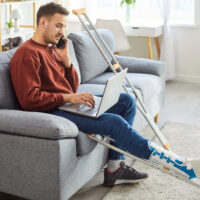What Not to Say to an Insurance Company (or Anyone Else) After a NYC Sidewalk Trip and Fall

Trip and fall accidents on New York City sidewalks are more common than many people realize. Uneven pavement, broken curbs, and poorly maintained walkways can leave pedestrians seriously injured and suddenly facing medical bills, time off work, and long-term recovery.
After a sidewalk fall, what you say (or don’t say) matters. Whether you are speaking to a property owner, an insurance adjuster, or even posting online, certain statements can hurt your case. Insurance companies are always looking for ways to minimize payouts, and careless words may be used against you later.
Below, we outline what not to say after a sidewalk accident in New York City and why keeping quiet or seeking legal guidance first is often the safest move. For specific advice or assistance with your legal claim after a fall in Manhattan, Brooklyn, Queens or the Bronx, contact Leandros A. Vrionedes, P.C., to speak with an experienced NYC sidewalk trip and fall lawyer.
Don’t Downplay Your Injuries
In the immediate aftermath of a fall, adrenaline and embarrassment may lead you to say things like “I’m fine” or “It’s not that bad.” Even if you believe your injuries are minor, avoid making these statements. Many injuries, including concussions, fractures, or soft tissue damage, may not be obvious right away. If you minimize your pain at the scene, the insurance company may later argue that your injuries developed elsewhere or aren’t as serious as you claim.
Don’t Apologize or Accept Blame
It’s natural to want to smooth over an awkward situation by saying “I should have been more careful,” “It was all my fault,” or “I’m so clumsy.” Statements like these can be twisted into admissions of fault. In sidewalk liability cases, determining who is legally responsible is often complex; sometimes the City of New York is liable, sometimes the adjacent property owner. By apologizing or blaming yourself, you risk undermining your claim before it’s even investigated.
Don’t Speculate About the Cause
Insurance adjusters or property managers may ask you what happened. Stick to the facts: where you were walking, what you saw, and that you fell. Do not guess or offer opinions such as, “Maybe I wasn’t watching where I was going,” or “I think it was just bad luck.”
Speculation gives insurers room to argue alternative theories of causation. Let the evidence—photos of the sidewalk defect, witness testimony, and expert reports—speak for itself.
Don’t Agree to a Recorded Statement
Insurance adjusters often call soon after an accident, asking to “just get your side of the story.” What they are really doing is collecting information to reduce their liability. Never agree to a recorded statement without a lawyer present. You may unintentionally say something that is later taken out of context or used against you.
Don’t Discuss Medical Details or Prognosis
It may seem harmless to say, “My doctor thinks I’ll be back to normal in a few weeks,” but such statements can backfire if your recovery takes longer than expected. Avoid discussing diagnoses, treatment plans, or prognosis with insurance companies. Medical records and your treating physician’s testimony should establish the facts, not your casual remarks.
Don’t Accept an Early Settlement Offer
Insurers know that accident victims may be stressed and financially strained. They may dangle a quick settlement to get you to sign away your rights before you fully understand the extent of your injuries. Saying “yes” too early can mean leaving significant compensation on the table. Always have a lawyer review any settlement offer before agreeing.
Don’t Overshare on Social Media
Posting about your accident, recovery, or even daily activities can seriously harm your case. Insurance investigators routinely monitor claimants’ social media accounts. Avoid:
- Sharing accident details or photos.
- Complaining about pain or recovery.
- Posting pictures of vacations, hobbies, or outings that could be misconstrued.
- Writing inflammatory statements like “I’m going to sue!”
Even innocent posts can be twisted to suggest your injuries are exaggerated.
What to Do Instead
While there are many things you shouldn’t say, here’s what you should do:
- Seek immediate medical care and follow the doctor’s orders.
- Report the accident to the property owner or City if required.
- Document the scene with photos and witness information.
- Contact a New York City sidewalk trip and fall lawyer before speaking to insurers.
Your attorney can handle communications on your behalf, ensuring that nothing you say jeopardizes your right to fair compensation.
Speak With NYC Sidewalk Accident Lawyer Leandros A. Vrionedes
If you’ve been injured in a sidewalk trip and fall in New York City, don’t risk saying the wrong thing to an insurance company. A skilled personal injury attorney can protect your rights, guide you through the claims process, and fight for the full compensation you deserve. Contact Leandros A. Vrionedes, P.C., for a free consultation to discuss any claims you may have.
